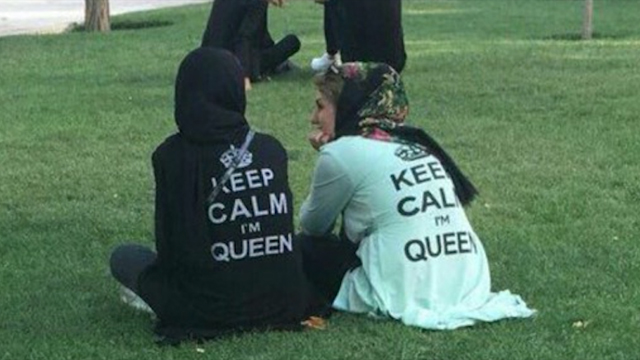Iran’s Conservatives Lash Out at New Female Fashion Trends

Iran’s anti-vice squads, also referred to as the morality police, are particularly busy in the hot summer months when Iranian women wear lighter clothes and are less observant of the mandatory hijab. But this year the squads are focusing on a new “threat:” women wearing clothes with large English words on them.
On National Hijab and Chastity Day (July 11, 2016), state-sponsored events occurred in ten locations in Tehran and in 400 others throughout the country to “defend the sanctity of the family” and promote the strict observance of the hijab.
The events, mostly organized by the Basij paramilitary organization (a subsidiary of the Revolutionary Guards) and affiliated groups featured ultra-conservative officials and clerics who touted a common claim: foreign enemies of the Islamic Republic are waging a “soft war” to encourage women to take off their hijabs.
“In the early years of the [1979] revolution people accepted the hijab [becoming mandatory for women] without much force, but this trend did not continue and now we have a situation where we are moving from lax observance of the hijab to no hijab at all,” said the Deputy Head of the Judiciary in Charge of Social Affairs Mohammad Bagher Olfat during Judiciary Week (June 21-27).
Controlling Women’s Bodies
The focus on the hijab last week brought attention to this new fad among young people in Iran, especially in Tehran, of wearing the manteau—long, form-concealing coats that women were told to wear when in public following the revolution—with large English phrases printed on them, usually with a humorous message.
In response to the negative light being shown on the fashion trend, Iranians light-heartedly shared photos of the latest phrases being featured on the clothing on social media last week. But conservatives were not laughing.
“The spread of these kinds of products are against public morality and indicate a lack of attention by the officials in charge of cultural matters,” said Minoo Aslani, the female secretary general of the hardline Women’s Basij Organization on July 11, 2016.
“There are dirty and disdainful phrases printed on the back of these manteaus and so they should be banned from sale and removed from stores as soon as possible,” she said in a separate interview that same day.
Some of the phrases include variations of the World War II British slogan, “Keep Calm and Carry On,” such as “Keep Calm, I am Queen” or “Keep Calm, I am Insured By Abolfazl.”
“I have seen girls and boys wearing clothes that have the word ‘Queen’ on them. This is an ugly manifestation of a Western trend that has entered our country with evil intentions devised behind the scenes,” said the conservative female former Tehran MP Zohreh Tabibzadeh on July 11, 2016. “This is obviously a calculated plan that is spreading because the government’s cultural policies leave our country’s gates wide open.”
Compulsory Hijab: Not a Life Sentence?
In early July 2016 a senior theologian based in the holy city of Qom issued a fatwa (religious decree) permitting Iranian Muslim women living abroad to remove their hijab under certain circumstances.
Asked how Muslim women should respond if they were required to remove their hijab to continue their education in countries like Turkey, Ayatollah Nasser Makkarem Shirazi said: “Given that important posts would be filled by loose women if religious Muslim women are unable to receive higher education, the latter are permitted to remove their hijab if necessary. But in all other cases they should observe it.”
Mohammad Oliaei-Fard, an Iranian legal expert, described Makkarem Shirazi’s fatwa as a “historic” step that could eventually lead to the end of the compulsory hijab.
“The Constitution says that laws must be based on Islam, but Islamic precepts can be interpreted in a way to protect the individual and social rights of citizens, including the right to not wear the hijab. Therefore, this fatwa could be an important step in that direction,” said Oliaei-Fard. “As the founder of the Islamic Republic [the late Ayatollah Rouhollah Khomeini] said, ‘preserving the state is most important’… therefore the hijab could become voluntary instead of mandatory, if the preservation of the state requires it.”
Despite being imposed on all Iranian women after the revolution, the hijab has gradually transformed into many different forms and fashions in Iran. Women have been creatively skirting religious sensitivities, regardless of frequent warnings from the supreme leader, Ali Khamenei, and his conservative followers about foreign plots to undermine traditional values.
“There’s no doubt that this new immoral trend has been orchestrated. Our officials are not prepared to respond to questions about the wide availability of these immoral products in our Islamic society,” said Aslani, who regularly preaches hardline policies in the media. “It appears that those who are making profits and plotting a cultural invasion are much smarter than our officials in charge of cultural affairs. It’s as if they are in deep sleep.”






